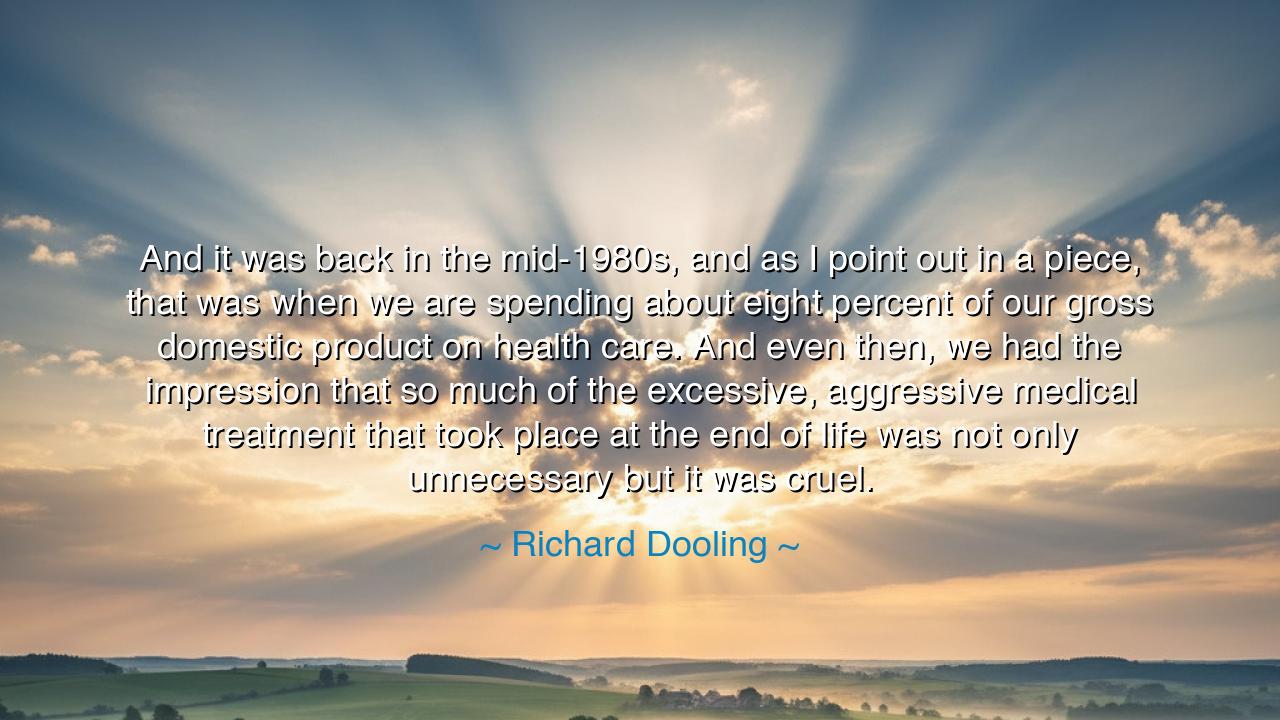
And it was back in the mid-1980s, and as I point out in a piece
And it was back in the mid-1980s, and as I point out in a piece, that was when we are spending about eight percent of our gross domestic product on health care. And even then, we had the impression that so much of the excessive, aggressive medical treatment that took place at the end of life was not only unnecessary but it was cruel.






Hear the solemn words of Richard Dooling, who spoke with the clarity of one reflecting on the burdens of an age: “And it was back in the mid-1980s, and as I point out in a piece, that was when we are spending about eight percent of our gross domestic product on health care. And even then, we had the impression that so much of the excessive, aggressive medical treatment that took place at the end of life was not only unnecessary but it was cruel.” In these words lies both lament and warning, for he points to the strange paradox of modern medicine: that in seeking to preserve life at all costs, we may sometimes rob it of its dignity.
The meaning of this utterance is profound. Dooling reminds us that while societies poured vast sums of wealth into health care, the pursuit of more treatment was not always synonymous with compassion. Indeed, the insistence on excessive, aggressive medical treatment—particularly in the twilight of life—often left the dying in torment rather than peace. What should have been a time of gentleness and farewell became instead a theater of interventions, where the body was kept alive though the soul longed for rest. To call this “cruel” is to expose the hidden tragedy: that medicine, without wisdom, can become tyranny over the very people it seeks to serve.
The origin of this reflection lies in the swelling debates of the late twentieth century, when medical technology advanced rapidly, offering ventilators, resuscitations, and life-extending procedures. These marvels brought hope, but also raised questions never before faced at such scale. Families, doctors, and patients alike found themselves trapped between possibility and mercy—between prolonging life and respecting the natural end. Dooling’s words rise from this crucible, recognizing that the true measure of care is not how long life is stretched, but how meaningfully it is honored.
History offers poignant examples. Consider the story of Karen Ann Quinlan in the 1970s, whose case brought national attention to the question of life support and the right to die with dignity. Though technology could preserve her body indefinitely, her consciousness never returned, and her parents pleaded for release from the machines. Their struggle before the courts revealed the painful truth that more treatment does not always mean more life—it may instead prolong suffering and deny peace. Dooling’s lament echoes such moments, reminding us that sometimes the greater act of compassion is restraint.
The emotional force of his words rests in the stark juxtaposition of progress and cruelty. How strange, he notes, that even when spending vast treasure—eight percent of GDP in his time—the outcome was not always mercy, but at times anguish. This is the paradox of human ingenuity: the tools that can heal and extend life can also, if used without wisdom, deepen suffering. The physician’s art, then, is not merely to preserve, but to discern: when to fight for life, and when to let go in reverence for death.
The lesson for us is clear: we must learn to balance compassion with technology, mercy with power. Families must not be afraid to ask, “Is this treatment an act of love, or an act of fear?” Physicians must not measure their success solely in survival rates, but in the dignity they preserve for their patients. And societies must not believe that more money or more intervention alone guarantees better care, for without wisdom, abundance becomes cruelty.
Therefore, let your actions reflect this truth. When confronted with illness in your family, speak openly of wishes and dignity. Support palliative care, which seeks not merely to extend days but to enrich them with comfort and peace. Teach your children that death, though sorrowful, is not the enemy when it comes naturally, but may become the enemy if delayed through unnecessary torment. Seek balance in health care—not only efficiency, but compassion, not only progress, but wisdom.
And so, remember the teaching of Richard Dooling: excess without compassion is cruelty. Let us not measure success by the length of days alone, but by the love, dignity, and gentleness with which those days are lived and concluded. In this way, we may honor both the miracle of medicine and the mystery of life’s final passage.






AAdministratorAdministrator
Welcome, honored guests. Please leave a comment, we will respond soon